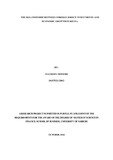| dc.description.abstract | Foreign Direct Investments (FDI) is generally defined as capital flows resulting from
the behavior of multinational companies while Economic Growth is defined as an
increase in the production and consumption of goods and services. Investment is the
most fundamental determinant of economic growth by being a source for building up
physical capital, creating employment opportunities, developing productive capacity,
and enhancing skills of local labor and managers through transfer of technology and
integration with the rest of the world. The study sought to determine the relationship
between foreign direct investment and economic growth in Kenya. This research was
conducted through a descriptive survey research design. The descriptive survey
research design was considered appropriate as it enables description of the
characteristics of certain groups, estimation of the proportion of people who have
certain characteristics and making of predictions. This study used quantitative,
secondary data. The secondary data sources were obtained from the Central Bank of
Kenya, World Bank and UNCTAD databases over a period of 15 years (1994-2014).
The data was collected based on the information about the variables. Quantitative data
was analyzed by descriptive analysis while qualitative data through content analysis.
The study may provide information to policy makers, scholars, academicians and
investors on the relationship between FDI and economic growth in Kenya. From the
findings, the study established that FDI and exchange rates positively affected the
economic growth while inflation rate and interest rates had an inverse relationship
with the country‟s economic growth. The study concludes that there exists a positive
relationship between FDI and the economic growth in Kenya. The study recommends
that the government policy makers need to push reform agenda in the domestic
market so as to attract more FDI in the Kenyan economy. The study also recommends
the implementation of sound monetary and fiscal policies by the government to
achieve a stable macroeconomic environment | en_US |

